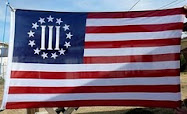Host a Sons of Liberty Seminar
Practical Ways to Resist Tyranny
You Will Learn:
* Who You Are
* Why You Do What You Do
* Your Resistance Style; The Mole, The Agitator, The Ghost, or The Resister?
* Monkey Wrenching - Fighting smarter, not harder.
* Resistance Tactics: Little Foxes, Fleabites, Simon Jestering, Radio-activism.
You will leave knowing the best way to be you to fight for Freedom!
How A Secret Society of Rebel Americans Made Its Mark on Early America!
Shrouded in secrecy, the origins of the Sons of Liberty began in Boston, Massachusetts through the leadership of one Samuel Adams (a well known American Revolutionary firebrand) in early 1765. For reasons of safety and secrecy, Sons of Liberty groups tended to meet late at night so as not to attract attention and detection of British officials and the American Loyalist supporters of the British Crown.
Although the movement began as a secret society, for reasons of safety and anonymity, the organization quickly sought to build a broad, public base of political support among the colonists. Even though the Sons seldom looked for violent solutions and eruptions, however sometimes, the actions and reactions of the Sons of Liberty took a violent turn. Tarring and feathering Loyalists, royal tax collectors, and other officials-- was a common practice carried out by the more radical elements of the organizations. Whatever they did they continued to elicit and promote political upheaval that tended to favor crowd action.
It was the Boston Committee of Correspondence that directed the Boston Tea Party action of December 16, 1773. Upset with the lack of redress concerning the new tax on tea established by the British government for importation of tea to Boston, a small band of the Boston Committee of Correspondence members (approximately fifty in number) lead by Samuel Adams, proceeded to empty three ships worth and 342 chests of tea into Boston Harbor in protest.
Were they a terrorist organization? The British certainly believed they were. After all, the Sons were advocating overthrow of the status quo government and independence for the thirteen colonies. Were they a patriotic organization? Many American colonists certainly believed they were. The Sons represented to them the American freedom fighter personified, fighting for their rights and ultimate independence. It should be noted that the Loyalists also had their version of Committees of Correspondence and Sons of Liberty namely: the United Empire Loyalists.
Finally, the decision on the Sons of Liberty comes down to a variation on an old saying "one man's terrorist is another man's patriot."
Have Seminar Will Travel: I am available to conduct this seminar on your site. Contact me: MitEtagniw@gmail.com
























